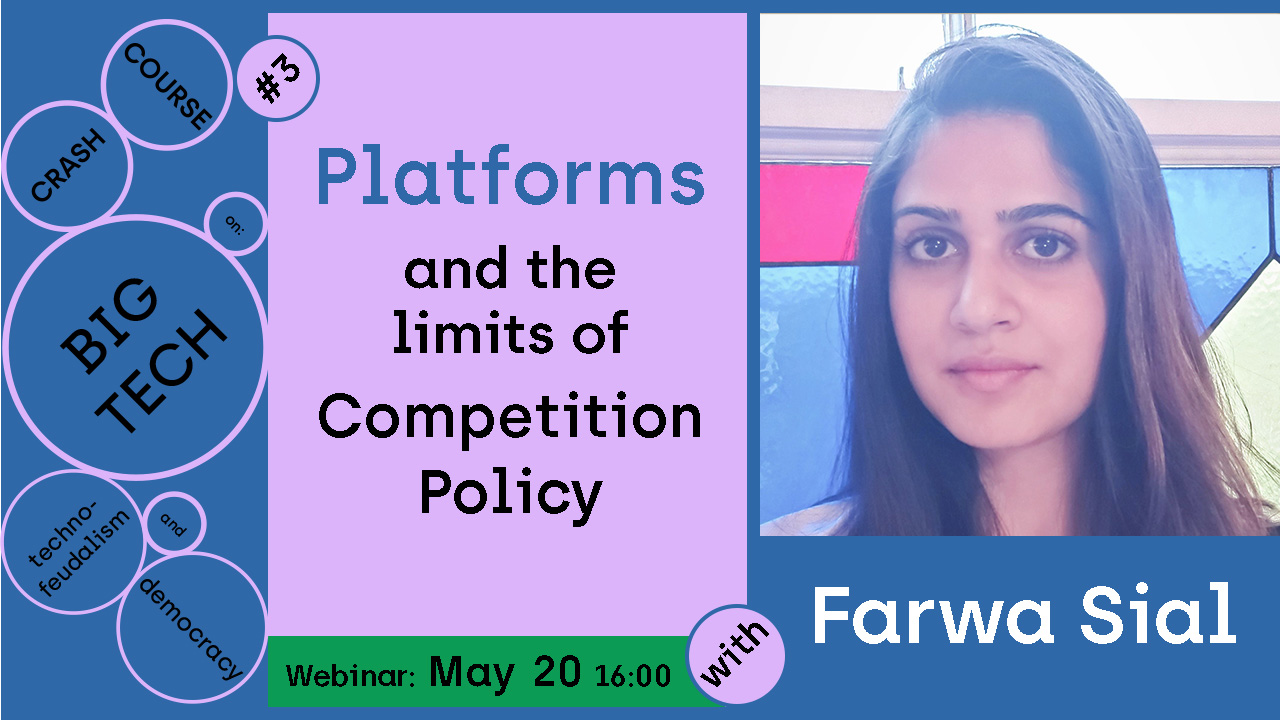Crash Course over Big Tech #3 met Farwa Sial
De derde aflevering van Crash Course over Big Tech, ‘technofeudalisme’ en democratie gaat over ‘de platformen en hoe beleid om concurrentie te bevorderen (mededinging) daar zijn grenzen heeft. Spreekster is Farwa Sial van Eurodad. Het webinar is op 20 mei (om 16:00) gratis toegankelijk. De spreektaal zal Engels zijn. (English version below)

(Bron: Crash Course Economics)
Platforms en de grenzen van het mededingingsbeleid
In deze derde aflevering bespreken we de uitdagingen waarmee Big Tech ons confronteert op het vlak van regulering. De platformeconomie heeft onze samenleving fundamenteel veranderd en heeft ervoor gezorgd dat steeds meer burgers afhankelijk zijn van steeds minder bedrijven. Door lobbywerk en onwetendheid en incompetentie op vele beleidsniveaus heeft deze sector zich massaal uitgebreid zonder veel overheidstoezicht. De VS zijn begonnen te praten over het opsplitsen van Facebook, maar critici waarschuwen dat dit niet voldoende is.
Meld je hier aan voor het webinar.
Over Farwa Sial (Eurodad)
Farwa Sial is Senior Policy and Advocacy Officer in Development Finance bij Eurodad en Research Fellow aan het Global Development Institute (GDI) van de University of Manchester. Zij is stuurgroeplid van Diversifying and Decolonising Economics (D-econ) en de Association of Heterodox Economics. Haar onderzoek spitst zich toe op comparatieve ontwikkeling, industriebeleid, ondernemingen en de evoluerende dynamiek van het laatkapitalisme in de context van financialisering en technologische ontwikkeling.
We hebben Farwa Sial gevraagd om in te zoomen op de regelgevingsproblemen en trends die intellectuele monopolies en de platformeconomie hebben opgeworpen. We vragen:
- Hoe heeft het gebrek aan dataregulering de opkomst van Big Tech mogelijk gemaakt?
- Waarom slagen de huidige kaders van het mededingingsbeleid er niet in om intellectuele monopolies te reguleren?
- Wat voor regulering hebben we nodig om de controle terug te krijgen en het publieke domein meer macht te geven?
————————-
English version:
Crash Course on Big Tech, techno-feudalism and democracy: May 20 2021 16:00 CET local time
Platforms and the limits of Competition Policy
In this third episode, we will discuss the challenges that Big Tech confronts us with in terms of regulation. The platform economy has fundamentally changed our societies and has made more and more citizens dependent on less and less companies. Due to lobbying efforts as well as ignorance and incompetence on many policy levels, this sector has massively expanded without much government oversight. The US has started talking about splitting up Facebook, but critics warn that this is not sufficient.
Speaker(s): Farwa Sial (Eurodad)
Farwa Sial is a Senior Policy and Advocacy Officer in Development Finance at Eurodad and a Research Fellow at the Global Development Institute (GDI) University of Manchester. She is the steering group member of Diversifying and Decolonising Economics (D-econ) and the Association of Heterodox Economics. Her research focuses on comparative development, Industrial policy, corporations and the evolving dynamics of late-capitalism in the context of financialization and technological development.
Platforms and the limits of Competition Policy — with Farwa Sial
Webinar: Thursday, May 20 2021 16:00 – 17:00 CET
In this third episode, we will discuss the challenges that Big Tech confronts us with in terms of regulation. The platform economy has fundamentally changed our societies and has made more and more citizens dependent on less and less companies. Due to lobbying efforts as well as ignorance and incompetence on many policy levels, this sector has massively expanded without much government oversight. The US has started talking about splitting up Facebook, but critics warn that this is not sufficient.
We have asked Farwa Sial to zoom in on the regulatory problems and trends that intellectual monopolies and the platform economy have raised. We ask:
- How has the lack of data regulation enabled the rise of Big Tech?
- Why are the current competition policy frameworks falling short of regulating intellectual monopolies?
- What kind of regulation do we need to regain control and empower the public domain?